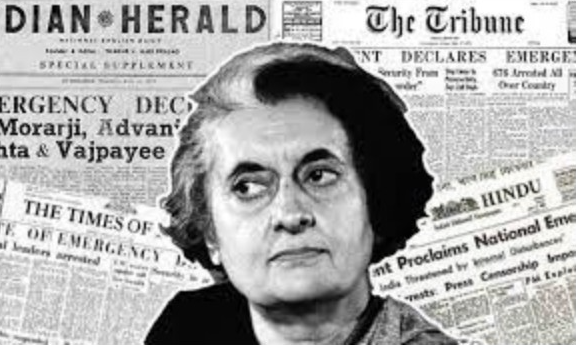Remembering assault on freedom of press during Emergency under Indira Gandhi
Total Views |
On June 26, 1975, then President Fakhruddin Ali Ahmed declared a state of Emergency in India citing a threat to national security by "internal disturbances". Addressing All India Radio (AIR) in the wee hours of June 26, 1975, the then Prime Minister of India Indira Gandhi, said, "The President has proclaimed Emergency. There is nothing to panic about."

However, Prime Minister Gandhi suspended constitutional rights and withdrew freedom of speech and press, laying guidelines for the press. Apart from this, she also expelled several foreign journalists and correspondents and withdrew accreditation from over 40 Indian reporters.
What were the restrictions heavily imposed on Press?
In the Cabinet meeting on June 26, 1975, she personally outlined a comprehensive policy regarding the media.
The meeting considered the following five main steps:
(1) The Press Council should be dissolved.
(2) All news agencies (P.T.I., U.N.I., Hindusthan Samachar and Samachar Bharati) should be amalgamated.
(3) The advertisement policy should be reviewed.
(4) Accommodation facilities given to dissenting journalists should be revoked, and
(5) Foreign correspondents not accepting Government policies should be sent back. It was agreed to impose strict censorship all over the country.
A suggestion was also given that an advisory council of some tame editors be set up to advise the information and broadcasting ministry in implementing censorship. The meeting also accepted the proposal for 'pre-censorship' and the requisite power for the purpose acquired by issuing an ordinance under Section 48 of D.I.R. 1971. But it was not possible to set up a censorship network all over the country right away. At least a couple of days were required for it. So it was decided that so long as censorship was not effective other means should be used to stop the publication of newspapers and news of the arrest of leaders, opposition demonstrations etc. prevented from reaching the people.
(Reference - People vs The Emergency - Saga of Struggle)
Arrests, threats
Since the press was not given freedom to publish the facts and truths about the Emergency, Most of the mainstream media newspapers and magazines were under the wrath of Indira Gandhi government. Publishers like Himmat, Janata, Frontier, Sadhana, Swarajya among many others. Some were threatened to be thrown out of publications and others were put in jail. The Indian Express and the Stateman were first ones to protest through their editions.
As a revolt, The Indian Express and the Statesman left their editorial pages empty. This move was soon followed by other publications too. According to IE, journalists from The Times of London, The Washington Post, The Los Angeles Times were expelled. The Guardian and The Economists correspondents flew back to the United Kingdom after receiving threats. Journalist Kuldip Nayar was arrested by the police for protesting against the emergency in Delhi.
According to the Home Ministry, in May of 1976, almost 7,000 journalists and media personnel were arrested.
Some press gave in
On the other hand, The Hindustan Times, a leading English-language daily led by KK Birla, a prominent Indian industrialist, became a staunch supporter of the government during this period. The Times of India, whose board of directors included one-third government nominees, quickly surrendered its independence and became a mouthpiece for the government. Political cartoons disappeared overnight, and no one dared to publish a negative depiction of Mrs Gandhi. In south India, The Hindu felt that caution was the better part of valour and acted accordingly.
Even journalists like Khushwant Singh, the editor of "The Illustrated Weekly of India" at the time, supported the Emergency. He remarked, "By May 1975 public protests against Mrs Gandhi's government had assumed nationwide dimensions and often turned violent. With my own eyes I saw slogan-chanting processions go down Bombay thoroughfares smashing cars parked on the roadsides and breaking shop-windows as they went along. Leaders of opposition parties watched the country sliding into chaos as bemused spectators hoping that the mounting chaos would force Mrs Gandhi to resign."
Freedom
The Opposition leaders were also fighting the same cause across the country. One of them was a veteran Bharatiya Janata Party, the then Janata Party leader LK Advani, who spent months in jail during the Emergency. His words ring in the ears of every Indian after the Emergency was lifted. He addressed the media and said, "You were asked only to bend, but you crawled."

